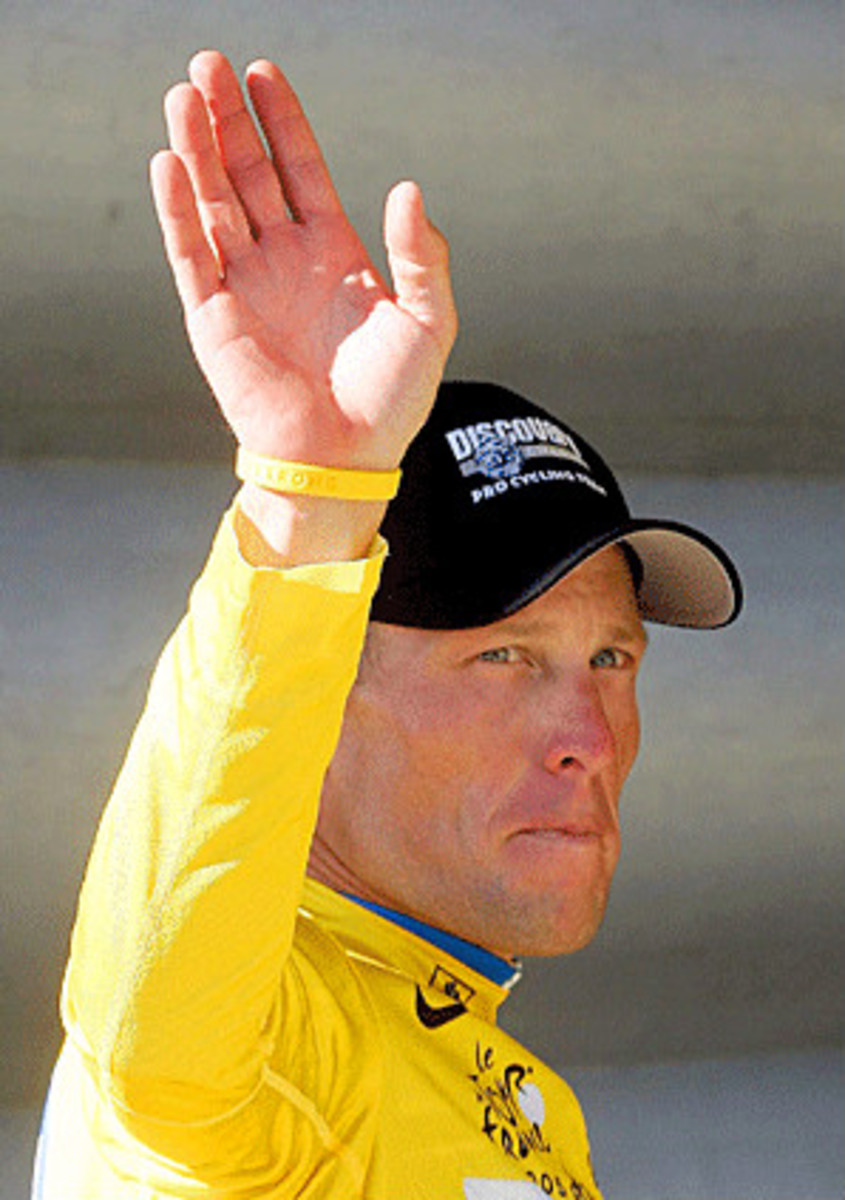Armstrong ended his fight over doping, but who <italics>really</italics> cares?
"Today I turn the page," he proudly announced in his statement, which he presumably wrote with The Star Spangled Banner playing on his iPod. "I will no longer address the issue, regardless of the circumstances."
This is ridiculous. Doping charges are serious, the evidence is significant and some credible people have accused Armstrong. (I mean, how much of a jerk would Armstrong have to be for this many people to want to frame him?) Armstrong was losing this battle. He can't just hide the ball and declare the game over, except ...
Well, except maybe he can.
He is banking on one thing here: That we don't care if he used drugs.
He is probably right.
We don't care.
Admit it: We ... don't ... care.
If athletes who use performance-enhancing drugs are criminals, then Armstrong pulled off the perfect crime. Most Americans only cared about the Tour de France because Armstrong won it; now that those wins are gone, we don't care about the event anymore. Genius.
Barry Bonds toppled Hank Aaron for a coveted record. Armstrong stole an ugly yellow shirt from the French. So what? Livestrong, man.
Sure, there were some cyclists who lost their chance at their dream because they refused to take drugs. I feel genuinely horrible for them. It isn't fair. But I suspect most Americans figure that hey, you take a risk when you go biking in the mountains. Next time, call a cab.
Sports columnists will muster outrage, and cycling insiders will nod their heads, because they are not surprised. (If you have been paying any attention over the last 10 years, you should not be surprised.) And I'm sure the initial wave of stories will be about the downfall of Lance, a lost legacy, tainted Tours, etc.
But how powerful will that wave be? How long will it last?
If Armstrong were a baseball star, then we know the answer: The wave would define him for years. But he is not a baseball star. And so in a year, five years, 10 years ... well, I could be wrong about this, but I think Armstrong will continue to be immensely popular in the United States. He has raised a ton of money to fight cancer. He did come back from his own cancer battle to achieve every American's fondest dream: becoming famous. The title of one of his books was right, if not in the way he intended: It's Not About The Bike. At least, it's not about the bike now, and hasn't been for a while.
I have believed, for several years, that Armstrong is guilty. I remember reading a piece on him in TheNew Yorker a decade ago and finding this sentence: "After I watched Armstrong train and spent time with his coaches, the only way I could be convinced that he uses illegal drugs would be to see him inject them." The implication was that Armstrong works so hard, he couldn't possibly be using steroids. The naivete astonished me. If anything, steroid users work harder than non-users. Steroids let them do that. That is a primary reason so many athletes use them.
But people believe what they want to believe. Even if you believe his accusers, as I do, you must admit: The accusers make you want to wash your hands. This was a case between a likely drug cheat and obsessive, unlikeable prosecutors, fueled by other drug cheats as witnesses. If this were divorce court and I were a judge, I'd give all the money to the dog.
Normally in doping cases, we are outraged because we feel like the athlete fooled us. The first time I felt this way was in 1988, when I watched Ben Johnson win the men's 100-meter dash at the Seoul Olympics. I remember Johnson finishing in 9.79 seconds, a record, and pointing a single finger in the air as he looked over at his rival Carl Lewis.
Then Johnson tested positive, and the whole thing felt utterly fraudulent. But the real comparison for Armstrong is with Lewis. There were reports after Lewis retired that he failed a drug test at the 1988 Olympic Trials, and the U.S. Olympic Committee gave him a pass. Lewis is still considered an all-time great Olympian. (He is also considered a fairly unlikeable guy with horrible p.r. skills -- but he was viewed that way in 1988 too.) We don't pay close enough attention to track and field to worry about whether Lewis doped in the 1980s. We enjoyed the story when it happened, and that's how we remember him.
Again, I may be wrong. But I think that is how we will remember Armstrong as the years pass too. When we started to figure out Mark McGwire had used steroids, it was disappointing because he fooled us.
Armstrong did not really fool us. Come on. How many of you really knew how Armstrong won his titles in the first place? If I'd pinned you in the corner of the world's worst dinner party eight years ago and asked "What makes Lance Armstrong so great?," what would you have said? He moves his left foot forward and then his right foot forward and then his left foot forward and he does it all so fast! So very, very fast!
As time went on, the people who cared realized he had probably been cheating. And the people who just liked Lance Armstrong didn't care.
He made the right decision Thursday. He ended a game he probably deserved to lose. It will be hard for him to vacation in Paris now, but I didn't get the sense he liked those folks much anyway. The U.S. Anti-Doping Agency says Lance Armstrong cheated to win bike races. Armstrong says he is trying to cure cancer. I think a lot of people would rather listen to Armstrong.





